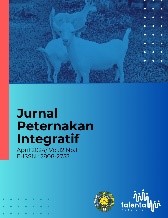Potential of Opuntia cochenillifera (L.) Mill as a Sustainable Forage Resource to Improve Livestock Productivity in Tropical Regions
DOI:
https://doi.org/10.32734/jpi.v13i2.22372Keywords:
Opuntia cochenillifera, Sustainable Forage, Tropical Livestock, Drought Tolerance, Biomass ProductivityAbstract
Tropical regions are increasingly vulnerable to climate change, which threatens forage availability and livestock productivity due to drought, land degradation, and water scarcity. Opuntia cochenillifera (L.) Mill, a drought-tolerant forage cactus, emerges as a promising solution for resilient and sustainable livestock feeding systems. This review explores its botanical and agronomic characteristics, nutritional profile, and environmental adaptability. Opuntia cochenillifera demonstrates high water-use efficiency, biomass productivity, and nutritional value, making it suitable for arid and semi-arid regions. Its integration into silvopastoral and agroforestry systems enhances environmental sustainability through improved soil health, reduced erosion, and potential carbon sequestration. The cactus also offers economic benefits by lowering feed costs and supporting year-round livestock productivity. However, limitations such as low protein content, potential invasiveness, and high-input management needs remain challenges to be addressed. Future research should focus on genetic improvement, biotechnology applications, and supportive agricultural policies to promote widespread adoption. Overall, Opuntia cochenillifera holds considerable promise for advancing climate-smart and sustainable livestock systems in tropical regions.
Downloads
Published
Issue
Section
License
Copyright (c) 2025 Jurnal Peternakan Integratif

This work is licensed under a Creative Commons Attribution-ShareAlike 4.0 International License.
The Authors submitting a manuscript do so on the understanding that if accepted for publication, copyright of the article shall be assigned to Jurnal Peternakan Integratif as well as TALENTA Publisher Universitas Sumatera Utara as the publisher of the journal.
Copyright encompasses exclusive rights to reproduce and deliver the article in all forms and media. The reproduction of any part of this journal, its storage in databases and its transmission by any form or media, will be allowed only with written permission from Jurnal Peternakan Integratif.
The Copyright Transfer Form can be downloaded here.
The copyright form should be signed originally and sent to the Editorial Office in the form of original mail or scanned document.















